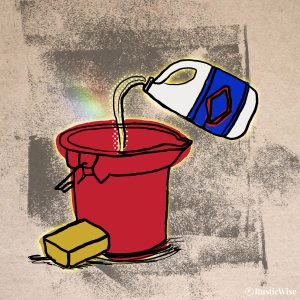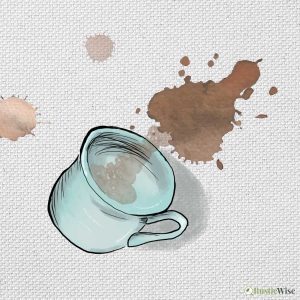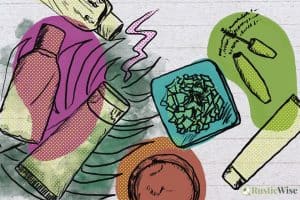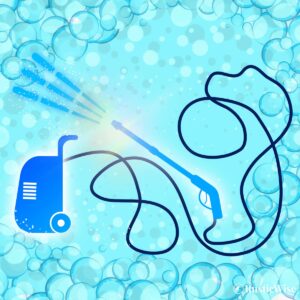Homemade Soap Scum Cleaner With Antibacterial Properties

RusticWise is supported by its readers. When you purchase through links on our site, we may earn an affiliate commission. As an Amazon Associate, we earn from qualifying purchases. Thank You!
Soap scum is the scourge of the bathroom, as anyone with hard water knows. If you’ve tried commercial cleaners and want to make the switch to something with fewer chemicals, you’re in luck. Round up a few ingredients from your pantry.
We have an easy homemade soap scum cleaner that will leave your tub and shower looking sparkly clean. It’s a double-whammy using a 50/50 vinegar and water spray followed by an easy antibacterial scrub with baking soda, Castile soap (or dish soap), and essential oils.
Ready to put scum in its place and restore your bathroom to its former glory? Roll up your sleeves and let’s begin!
What exactly is soap scum?
Soap scum is a white or greyish film made of mineral deposits that builds up on your bathroom surfaces, or metal fixtures. It’s caused by the buildup of hard water minerals (specifically calcium and magnesium) and soap on the walls and fixtures of your bathroom.
Over time, soap scum will build up and harden and become more difficult to remove. By preventing these minerals from building up, you can keep your bathroom cleaner for longer and save yourself time cleaning.
If you have hard water, you’ll be sure to notice the buildup of white crud around faucets, showerheads, showers and bathtubs.
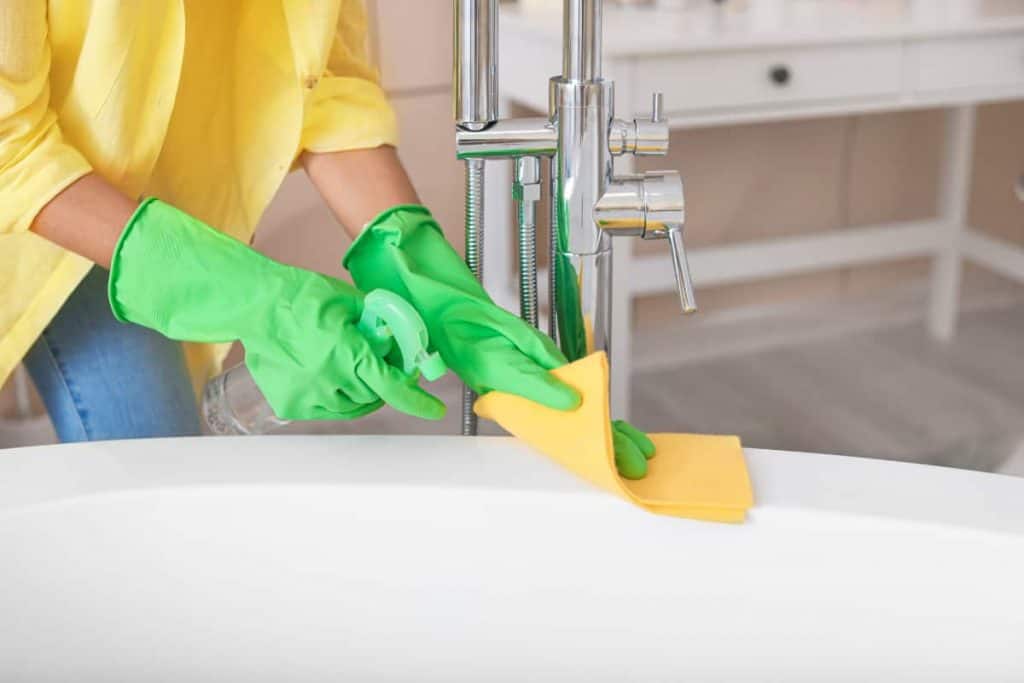
How does soap scum form?
Soap scum is a problem that occurs when residue from soap bars or body oils are combined with minerals from hard water. Hard water contains calcium and magnesium ions. When these mineral ions combine with soap residue, it creates an insoluble sticky film or precipitate.
Using homemade soap bars or other body products with surfactants can cause the development of soap scum if you have hard water. (Psst—if you make your own DIY soap, did you know that adding a bit of citric acid to your soap recipe cuts down on soap scum?)
Tip: The easiest way to keep soap scum at bay is to keep a squeegee in the shower. Use a squeegee after you bathe to remove soap and shampoo from the walls and floor of your shower or tub.
Reasons for making your own DIY soap scum remover
Many commercial shower and tub cleaners contain harsh chemicals and questionable ingredients that are not ideal for your health.
Luckily, there are more gentle cleaning agents (that you likely already have at home) that can get the job done!
Homemade soap scum remover is inexpensive and easy to make. The best part about it is that you know exactly what’s in the product.
Those of you who have soap scum buildup on shower doors, sinks, bathtubs and other bathroom surfaces will do anything to rid your bathroom of that discoloration and buildup. Homemade soap scum remover is the solution to all your soap scum problems!
Green cleaning ingredients for banishing soap scum
Gather a few cleaning supplies and round up a few ingredients. You probably already have these eco-friendly items at home.
White vinegar
There are many different types of vinegar, but white distilled vinegar is widely available and just the thing to tackle soap scum on tub, tile, and shower doors.
The active cleaning ingredient in vinegar is acetic acid. Most bottles of white vinegar you can find at the grocery store contain a 5 percent solution of acetic acid. For even more cleaning action, you can find some pickling vinegars which contain between 5 and 7 percent acetic acid.
As an acidic cleaner, vinegar is effective at breaking down soap scum, mineral deposits and water spots from glass, tile, and tub. It can also remove rust and descale water stains. Plus it also polishes metal faucets on sinks, showers, and tubs.
Vinegar also works great on mirrors and glass surfaces like shower doors. Not only will you have shiny and clean shower doors, but vinegar also deodorizes and disinfects as well. It’s a versatile cleaning option that you can also use on your sink and bathtub as well!
Note: Do NOT use vinegar on delicate porous stone surfaces such as limestone, granite, or marble, as it may etch the surface. Tread carefully when using vinegar on unsealed grout—do a patch test first.
Baking soda
A mild alkaline abrasive, baking soda (sodium bicarbonate) is gentle enough for most bathroom surfaces. It provides scrubbing power without damaging surfaces. Sometimes this natural powder is called a “scratchless abrasive.”
As a natural mineral abrasive, baking soda also neutralizes odors (handy for smelly places like the bathroom!).
Castile soap or liquid dish soap
Banishing greasy buildup and removing organic particles is what Castile soap or dish soap such as Dawn or Palmolive excels at. As a mild alkaline cleaning agent, liquid soaps remove oil or grease particles, as well as banish dirt on surfaces.
While liquid dish soap works, many people flock to Castile soap for its natural ingredients, including vegetable-based oils like coconut oil, palm oil, olive oil, and hempseed oils.
Essential oils
Some essential oils have antibacterial properties, making them great for adding to DIY cleaners. A few antibacterial essential oils to choose from include lavender, lemon, orange, rosemary, tea tree, and thyme.
Here’s how to remove soap scum
Soap scum is a troublesome and unsightly problem. Luckily, it’s one that’s easy to fix as long as you have a little patience and the right products.
We have an easy two-step process to get rid of hard buildup.
First, you’ll start with a vinegar spray to soften scum from shower walls and other problem areas.
Next, you’ll follow up with an easy antibacterial scrub featuring baking soda and Castile soap (or dish soap).
Step 1: Vinegar and water spray
You’ll need:
- White distilled vinegar
- Water
- Spray bottle
Fill a clean spray bottle with a 50/50 mix of vinegar and water.
(If the strong vinegar smell irritates you, don’t forget to open a window or turn on a fan. Don’t worry about the smell lingering—it soon dissipates!)
Spray the vinegar solution targeting soap scum on shower walls, shower doors, faucets, and shower heads. Let the mixture sit for at least 20 to 30 minutes (or longer for tough scum build up). This gives the acetic acid time to work its magic and break down hard water stains and deposits.
Now that you’ve loosened the soap scum, it’s time to tackle it directly. Use a sponge or cleaning cloth to gently scrub the softened scum.
On to the next step!
Step 2: Apply homemade cleaner
Now that vinegar has softened caked on grime, make this antibacterial soft scrub. I found this recipe in the handy book Easy Green Living: The Ultimate Guide to Simple, Eco-Friendly Choices for You and Your Home by Renée Loux.
This soft scrub recipe is safe for most bath and tub surfaces, including acrylic, ceramic, vinyl fiberglass, and PVC.
Tip: Avoid using coarse abrasive tools such as coarse wool pads or metal scrubbing brushes which can damage surfaces.
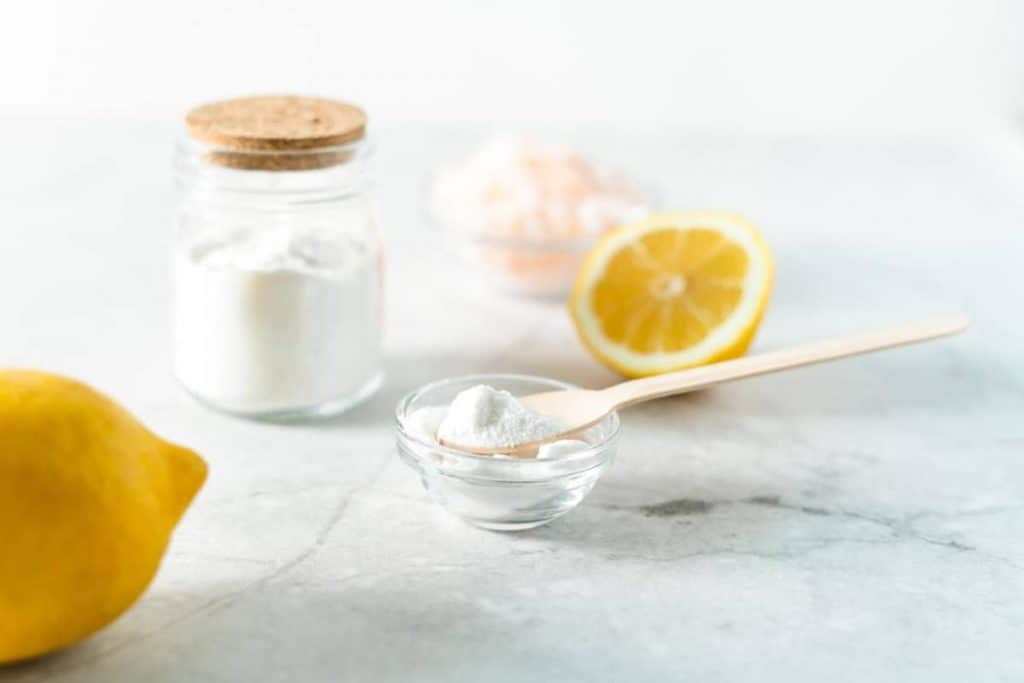
Homemade antibacterial soft scrub recipe
You’ll need:
- ½ cup baking soda
- 2 to 3 tablespoons of liquid Castile soap or Dawn dish soap
- 12 to 20 drops essential oil with antibacterial properties (lavender, lemon, orange, rosemary, tea tree, or thyme)
- Combine baking soda and liquid soap in a bowl with a fork. The mixture will have a frosting-like consistency.
- Add essential oils. Combine until well mixed.
To use, scoop a small amount onto a sponge or gentle scrubbing brush. Scrub until soap scum comes off. Rinse well with water.
Repeat if necessary. Once you’re satisfied with your work, rinse the area with water, pat dry and enjoy your squeaky clean tub and shower!
What’s the best way to clean soap scum from glass shower doors?
The best way to clean white film and hard mineral buildup from glass doors is with a spray using equal parts vinegar and water.
Spray liberally onto shower doors. Let it sit for at least 15 to 20 minutes (longer if needed). Then wipe clean with a sponge or cleaning cloth.
If there is still soap scum or tough stains on the shower doors after wiping them down, then you can apply a bit of the DIY soap scum remover recipe above to remove the stains.
How to clean soap scum on metal faucets and fixtures
So, you have soap scum on your metal? White vinegar is great at breaking down hard water minerals. Make a vinegar spray using equal parts water and vinegar. Spray the solution on trouble areas. Let it sit for at least 20 to 30 minutes to allow the acetic acid to work.
Wipe and rinse clean. For very stubborn water stains, you can dampen a cleaning cloth with the vinegar spray and let the cloth sit on the mineral buildup.
Use caution when trying to remove scum from natural stone
Natural stone tile is a versatile option for flooring, walls and shower stalls, but keeping soap scum from building up on it can be difficult.
The porous nature of natural stone surfaces such as granite, marble, or limestone means it requires a special cleaner specially formulated for the surface. Many commercial cleaning products may damage the surface, making it cloudy.
Look for a cleaner made specifically for natural stone. For milder options, look for the EPA Safer Choice label.
How to banish hard water deposits on shower curtains
White vinegar has many uses around the house, including laundering soiled items. In laundry, white vinegar gently disinfects and softens fabrics.
For plastic liners or curtains
- Soak in a 50/50 vinegar and water solution. In a large basin or bathtub, mix a solution of equal parts white vinegar and water and submerge the plastic shower curtain.
- Let the shower curtains sit for several hours, or overnight if possible. The acetic acid in the vinegar needs time to break down the hard minerals.
- Throw in a few towels along with the plastic shower curtain into the washing machine. Run a gentle cycle with water water.
- Remove and hang to air dry.
For fabric shower curtains
Vinegar has stain-removing power and is handy for banishing stained fabric shower curtains.
- Launder as usual following the instructions on the tag, but SKIP the detergent. Add 1 cup of white vinegar to the washer instead of detergent. (Using detergent and vinegar in tangent will cancel each other out; use one OR the other.) Or, add 1 cup of vinegar to the rinse cycle.
How to keep your bathroom free of soap scum
Honestly, this answer won’t thrill you, but here goes. A quick wipe down is the easiest way to keep your bathroom clean. The best way to prevent soap scum buildup is to regularly wipe down showers, tubs, sinks, or faucets using either a microfiber cloth, or squeegee.
By keeping surfaces clean and dry, there’s less chance of hard minerals building up. I like to use a squeegee and keep one in the shower. A minute or two of squeegeeing the shower door and tub makes my cleaning routine much easier.
👉If you like this post, see other Timeless Cleaning Tips You Need To Know.
Would you like more timeless tips via email?
Fun tips to help you live an independent, self-sustaining lifestyle. Opt-out at any time.


References
- Loux, Renée (2008). Easy Green Living: The Ultimate Guide to Simple, Eco-Friendly Choices for You and Your Home. Rodale Inc. pp 154-155. ISBN 978-1-59486-792-7.

Author: Theresa Tesolin
Theresa is co-founder of RusticWise. She helps people unleash their inner DIY spirit by encouraging them to get dirty and make or grow something from scratch.


